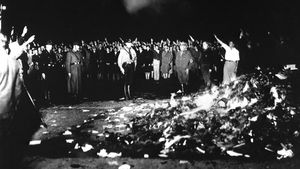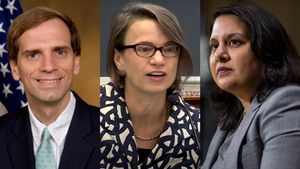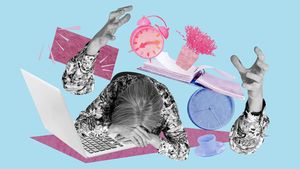A beloved teen comedy led Armonté Butler to become an advocate for sexual health, particularly for those who don’t often receive that critical information. Unlike that of certain mean girls, his message is that you can sit with us —and empower yourself with health education.
Based in the Washington, D.C., area, Butler is an accomplished health expert and champion for marginalized people, including youth, BIPOC people, and the LGBTQ+ community. He earned a master’s in public health from the Johns Hopkins Bloomberg School of Public Health, focusing on adolescent health risks, health equity, and policy. Among many other roles, Butler is the associate director of LGBTQ health and rights at Advocates for Youth, an organization dedicated to promoting effective reproductive and sexual health programs and policies for young people in the U.S. and the Global South.
As head of the Queer and Gender Equity Project, Butler helps provide community-based health care organizations with education, research, training, and technical assistance to increase support for queer youth of color and young people living with HIV. He manages the All Students Count Coalition and the National Youth HIV and AIDS Awareness Day project. He also leads YouthResource, a leadership program designed by and for LGBTQ+ youth of color.
We recently had a chance to chat with the inspiring 29-year-old health advocate about his life, his work, and what inspires him to keep going.
 Armonté Butler (far right) with members of YouthResource, a leadership program designed by and for LGBTQ+ youth of color.Catrece Mariano
Armonté Butler (far right) with members of YouthResource, a leadership program designed by and for LGBTQ+ youth of color.Catrece Mariano
How did you come to be a professional advocate for LGBTQ+ youth, particularly around sexual and reproductive health?
Mean Girls premiered in 2004 and remains a landmark in pop culture. The gym teacher’s exaggerated “Don’t have sex, because you will get pregnant and die!” mirrored too close to the sexual health education I received growing up. It was on a Thursday afternoon of high school sophomore year in a muggy gym auditorium where close to 60 peers and I received sex education information that spread shame and stigma, particularly concerning human immunodeficiency virus. After this lecture, I decided I no longer wanted a dishonest and stigmatized portion attached to sex education, and my passion for sexual health awareness grew.
I decided to take action while still in high school by joining the youth advisory board of a D.C.-based public health organization. The YAB trained teenagers to become peer health educators dedicated to ensuring young people’s access to medically accurate and comprehensive sexual health information. The YAB’s activities included providing feedback on youth-centered condom marketing campaigns and increasing sexually transmitted disease testing amongst young people in D.C. By participating in the YAB, I developed health education and promotion skills, cultural competency, and communication skills. I led after-school sessions at youth-serving community-based organizations on LGBTQ-inclusive sex education for young people from various backgrounds.
Since then, I’ve worked on issues related to adolescent and LGBTQ+ youth sexual and reproductive health at various federal, national, and international organizations.
You’ve achieved so much personally and professionally at a relatively young age and have done a lot of amazing work for the LGBTQ+ community and other marginalized folks. Where do you think this drive comes from?
Since I was younger, this drive has come from my belief that there is a better world worth fighting for. This drive also comes from growing up in a predominantly Black and Latinx neighborhood and realizing that we weren’t getting a fair shot at opportunity. The neighborhood I grew up in, in D.C., wasn’t near any grocery stores, safe parks, or playgrounds. When we’re thinking about creating safer spaces for LGBTQ+ youth and other marginalized children, we must also consider how our sexual and reproductive health intersects with how places and spaces are designed and invested in.
 Armonté Butler (second from left) with members of YouthResource, a leadership program for LGBTQ+ youth of color.Joy Bullock
Armonté Butler (second from left) with members of YouthResource, a leadership program for LGBTQ+ youth of color.Joy Bullock
Advocacy can be exhausting work and can lead to what many call “activist burnout.” How do you avoid that and stay motivated?
To avoid “activist burnout” and stay motivated, I go on vacations abroad and staycations in the U.S. as often as I can. I love traveling and exploring new museums, art spaces, restaurants, and beaches. I also enjoy reading books, visiting friends, and, most recently, cooking at home.
Tell us about any life-changing experiences you’ve had in your work.
In 2015, I studied human rights and social movements in Buenos Aires, Argentina. The program, initiated by the School for International Training, was entirely in Spanish and included opportunities that highlighted community-based organizations fighting for human rights and social welfare.
My experience in Argentina and courses related to global health and politics led me to apply for a university-funded fellowship for students interested in conducting an independent social science research project outside of the United States. While identifying potential topics and countries, I came across a few news articles that discussed stigma, discrimination, health care utilization, and HIV. One article, entitled “Dominican HIV/AIDS Groups Work to End Stigma,” stuck with me. Intrigued, I reached out to two of the organizations highlighted by the article, confirmed that I could work in partnership with them to support their organizational efforts and do interviews, and submitted a proposal to the fellowship committee.
This opportunity informed me of the various issues related to LGBTQ and HIV-related stigma. To support my cultural immersion and sustainable engagement, I interned at a community-based organization that provides out-of-school and inadequately resourced LGBTQ+ youth with job and business training and experience. My roles included teaching English, translating documents, and supporting key staff in applying for USA-based grants.

From Your Site Articles
Related Articles Around the Web

 Armonté Butler (far right) with members of YouthResource, a leadership program designed by and for LGBTQ+ youth of color.Catrece Mariano
Armonté Butler (far right) with members of YouthResource, a leadership program designed by and for LGBTQ+ youth of color.Catrece Mariano Armonté Butler (second from left) with members of YouthResource, a leadership program for LGBTQ+ youth of color.Joy Bullock
Armonté Butler (second from left) with members of YouthResource, a leadership program for LGBTQ+ youth of color.Joy Bullock











































































